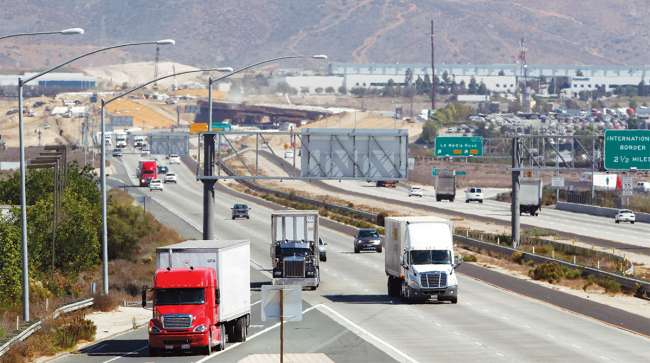Staff Reporter
California Trucking Group Sues State Over Contractor Test

The California Trucking Association and two independent owner-operators are suing California over the state’s test to determine if a driver is an employee or a contractor.
The association and operators Ravinder Singh and Thomas Odom filed a lawsuit in U.S. District Court for the Southern District of California on Oct. 25 seeking relief against the test, which was decided upon in Dynamex Operations West Inc. v. Superior Court of Los Angeles.
In that April decision, the California Supreme Court adopted the ABC test to determine whether a worker is an employee or an independent contractor.

According to the lawsuit document, the ABC test dictates that a worker is considered an independent contractor to whom a wage order does not apply only if the hiring agency establishes:
- That the worker is free from the control and direction of the hirer in connection with the performance of the work, both under the contract for the performance of such work and in fact.
- That the worker performs work that is outside the usual course of the hiring entity’s business.
- That the worker is customarily engaged in an independently established trade, occupation or business of the same nature as the work performed for the hiring entity.
The ABC test replaces the Borello test, which assessed multiple factors to determine whether an individual was an independent contractor.
The plaintiffs claim that the Dynamex decision hamstrings independent owner-operators from contracting and trucking for licensed motor carriers in the state. They also argue that the decision is unconstitutional because it conflicts with the Federal Aviation Administration Authorization Act of 1994, which prevents states from enacting laws that affect a motor carrier’s prices, routes and services.
“In that federal statute, it expressly pre-empts states from taking actions, instituting laws or regulations that would impact rates, routes or services,” CTA CEO Shawn Yadon told Transport Topics. “In this particular instance, when you have a California Supreme Court decision like Dynamex, which basically because of that test and the stringent nature of that test is virtually prohibiting the use of owner-operators, you are definitely disrupting and infringing on the F4A.”

Yadon
The trucking industry suffers from a driver shortage, and independent owner-operators make up a significant portion of the workforce. CTA reports that more than 500,000 drivers work as owner-operators in the United States. Some 70,000 of these drivers work in California.
“By choosing our own hours, setting our own schedules and being our own bosses, independent owner-operator truck drivers like me have found the freedom to spend more time with our families, earn higher compensation and, for some, the ability to start our own trucking business,” Singh said in a statement issued by CTA.
Singh, who lives in Fremont, Calif., owns a truck and hauls loads for different brokers throughout the state.
Owner-operators constitute an important element of the California trucking industry, according to Yadon. He said these operators have a long history of working with motor carriers, especially in fields such as agriculture and construction, which present seasonal demands.
Yadon pointed out that many motor carriers started out as businesses run by one person with a truck.
“We see that happen all the time. It’s hard to find a motor carrier out there today with multiple trucks who did not start with a single truck at some point,” Yadon said. “It is the ultimate entrepreneurial opportunity.”
Yadon said the plaintiffs await next steps in the case.

